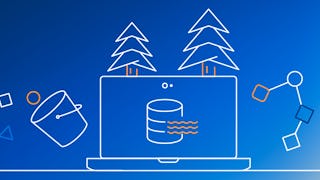- Browse
- Cloud Computing
Results for "cloud-computing"

Skills you'll gain: Google Cloud Platform, Data Sharing, Big Data, Data Access, Cloud Computing, Cloud Security, Data Integration, Data Management, Data Visualization
Beginner · Project · Less Than 2 Hours
 Status: PreviewPreviewL
Status: PreviewPreviewLLearnQuest
Skills you'll gain: Kubernetes, Application Deployment, Cloud Deployment, Containerization, Authentications, Authorization (Computing), Cloud-Native Computing, Cloud Infrastructure, Microservices, Infrastructure Architecture, Cloud Computing Architecture, Data Persistence, Software Architecture, Scalability, Command-Line Interface
4.3·Rating, 4.3 out of 5 stars323 reviewsIntermediate · Course · 1 - 3 Months
 Status: Free TrialFree Trial
Status: Free TrialFree TrialSkills you'll gain: Responsible AI, AI Product Strategy, Data Ethics, AI Enablement, Hybrid Cloud Computing, Business Leadership, Compliance Training, Cloud Computing Architecture, Strategic Leadership, Generative AI, Data Strategy, Return On Investment, Artificial Intelligence, Data Governance, Key Performance Indicators (KPIs), Talent Management
4.9·Rating, 4.9 out of 5 stars118 reviewsBeginner · Course · 1 - 4 Weeks
 Status: Free TrialFree TrialU
Status: Free TrialFree TrialUUniversidad de los Andes
Skills you'll gain: IT Security Architecture, Computer Security Incident Management, Network Security, Incident Response, Cryptography, Digital Forensics, Security Requirements Analysis, Penetration Testing, Information Systems Security, Threat Detection, Cloud Security, Vulnerability Assessments, Threat Modeling, Encryption, Cybersecurity, Vulnerability Management, Exploitation techniques, Data Security, Security Management, Personally Identifiable Information
4.7·Rating, 4.7 out of 5 stars530 reviewsBeginner · Specialization · 1 - 3 Months

Skills you'll gain: Data Sharing, Identity and Access Management, Authorization (Computing), Data Access, Google Cloud Platform, User Accounts, Data Migration, Data Management, Cloud Computing
Beginner · Project · Less Than 2 Hours
 Status: Free TrialFree TrialA
Status: Free TrialFree TrialAAmazon Web Services
Skills you'll gain: Data Lakes, Data Visualization, Data Architecture, Amazon Web Services, Data Engineering, Data Infrastructure, Data Warehousing, Data Processing, Amazon S3, Query Languages, AWS Identity and Access Management (IAM), Data Management, Data Transformation, Data Governance, Data Import/Export, Data Storage, Data Science, Machine Learning
4.7·Rating, 4.7 out of 5 stars305 reviewsBeginner · Course · 1 - 3 Months

Skills you'll gain: MySQL, Google Cloud Platform, Data Mining, Database Administration, Microsoft SQL Servers, Cloud API, PostgreSQL, Metadata Management
4.8·Rating, 4.8 out of 5 stars12 reviewsBeginner · Project · Less Than 2 Hours
 G
GGoogle Cloud
Skills you'll gain: Data Cleansing, Exploratory Data Analysis, Data Preprocessing, Data Manipulation, Data Transformation, Data Quality, Data Analysis, Data Visualization, Google Cloud Platform, Data Management
Beginner · Project · Less Than 2 Hours
 Status: PreviewPreviewG
Status: PreviewPreviewGGoogle Cloud
Skills you'll gain: Teradata SQL, Identity and Access Management, SQL, Data Import/Export, Data Integration, Google Cloud Platform, Extract, Transform, Load, Data Warehousing, Big Data, Data Architecture, Database Design, Database Architecture and Administration, Cloud Computing Architecture, Data Modeling, Data Security
Intermediate · Course · 1 - 3 Months
 Status: Free TrialFree TrialM
Status: Free TrialFree TrialMMicrosoft
Skills you'll gain: Unsupervised Learning, Microsoft Azure, Applied Machine Learning, MLOps (Machine Learning Operations), Regression Analysis, Predictive Modeling, Machine Learning, No-Code Development, Artificial Intelligence and Machine Learning (AI/ML), Model Deployment, Artificial Intelligence, Classification Algorithms, Supervised Learning
4.4·Rating, 4.4 out of 5 stars285 reviewsBeginner · Course · 1 - 4 Weeks
 Status: PreviewPreviewT
Status: PreviewPreviewTThe State University of New York
Skills you'll gain: Bioinformatics, Big Data, Analytics, Data Mining, Health Informatics, Biomedical Technology, R Programming, Predictive Modeling, Statistical Analysis, Molecular Biology, Feature Engineering, Data Preprocessing, Classification Algorithms
4.2·Rating, 4.2 out of 5 stars287 reviewsAdvanced · Course · 1 - 3 Months
 Status: Free TrialFree TrialG
Status: Free TrialFree TrialGGoogle Cloud
Skills you'll gain: Responsible AI, Prompt Engineering, LLM Application, Large Language Modeling, Generative AI, Data Ethics, Generative Model Architectures, AI Enablement, Google Gemini, Business Ethics, Artificial Intelligence, Prompt Engineering Tools, AI Security, AI Product Strategy, Ethical Standards And Conduct, Governance, Risk Analysis, Deep Learning, Supervised Learning, Stakeholder Analysis
4.7·Rating, 4.7 out of 5 stars7 reviewsIntermediate · Specialization · 1 - 3 Months
In summary, here are 10 of our most popular cloud-computing courses
- Consuming Customer Specific Datasets from Data Sharing Partners using BigQuery: Google Cloud
- Fundamentals of Kubernetes Deployment: LearnQuest
- GenAI for Execs & Business Leaders: Integration Strategy: IBM
- Ciberseguridad: Universidad de los Andes
- Data Publishing on BigQuery for Data Sharing Partners: Google Cloud
- Building Data Lakes on AWS: Amazon Web Services
- Build and Execute MySQL, PostgreSQL, and SQLServer to Data Catalog Connectors: Google Cloud
- Dataprep: Qwik Start: Google Cloud
- BigQuery Fundamentals for Teradata Professionals: Google Cloud
- Microsoft Azure Machine Learning: Microsoft










